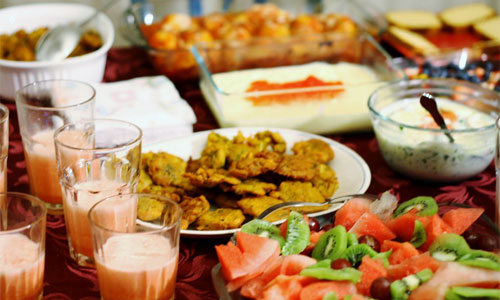Riyadh, Jul 8: Several young Saudis are collecting and repackaging tons of leftover food from iftar and suhoor tables this month for needy people throughout the country.

“Did you know that there are many poor families who need food, and go to bed sad and hungry, while the leftovers at weddings and parties are thrown into the garbage,” stated a slogan at an organization named ‘Collector of Leftover Food.’
A source from Albar Association’s Faisaliah branch told Arab News that there are young Saudi volunteers ready to receive calls from those people wishing to donate food. They will collect the food and repack it for the poor, he said.
An estimated 4,500 tons of food is thrown away every day in Saudi Arabia, said a study conducted by King Saud University’s department of agricultural sciences. It stated that about 30 percent of four million dishes, worth about SR1.2 million, prepared daily in Ramadan, goes to waste.
Total food waste in Jeddah amounts to 4,000 tons a day during the year, and increases in Ramadan to 5,300 tons a day, according to Jeddah municipality spokesman Mohammad Obaid Al-Buqmi.
In an earlier statement to Arab News, Khodran H. Al-Zahrani of the agricultural sciences college at KSU, said there were no accurate statistics yet of the quantity of food wasted in the country.
However, he said there appears to be a rise in wastage. This is because there is an abundance of food imported at subsidized rates, and the idea that leftover food cannot be eaten for health reasons.
“It is not uncommon to see half-eaten sandwiches, chicken, meat, rice, bread and other food, dumped into garbage cans throughout the Kingdom. Serving good quality, sufficient food is seen as an integral part of Saudi culture, therefore wastage is inevitable,” he said.
Al-Zahrani blames restaurants and hotels for the wastage because they set up huge banquets and buffets. Individuals are also responsible for their lavish tables during Eid festivals, weddings and parties. In addition, unsold food items are dumped along with the damaged goods.
According to the United Nation’s Food and Agriculture Organization (FAO), 1.3 trillion tons of food waste is produced globally on an annual basis, or nearly 30 percent of total global production. This amount is enough to feed 800 million poor people in the world.
In a recent report, the FAO said all food waste in developing countries is due to poor storage and transportation procedures. As excessive waste in the world poses a significant economic problem, the organization urged all nations to guarantee that excess food is given to poor people rather than thrown away, to improve global food security.





Comments
Add new comment